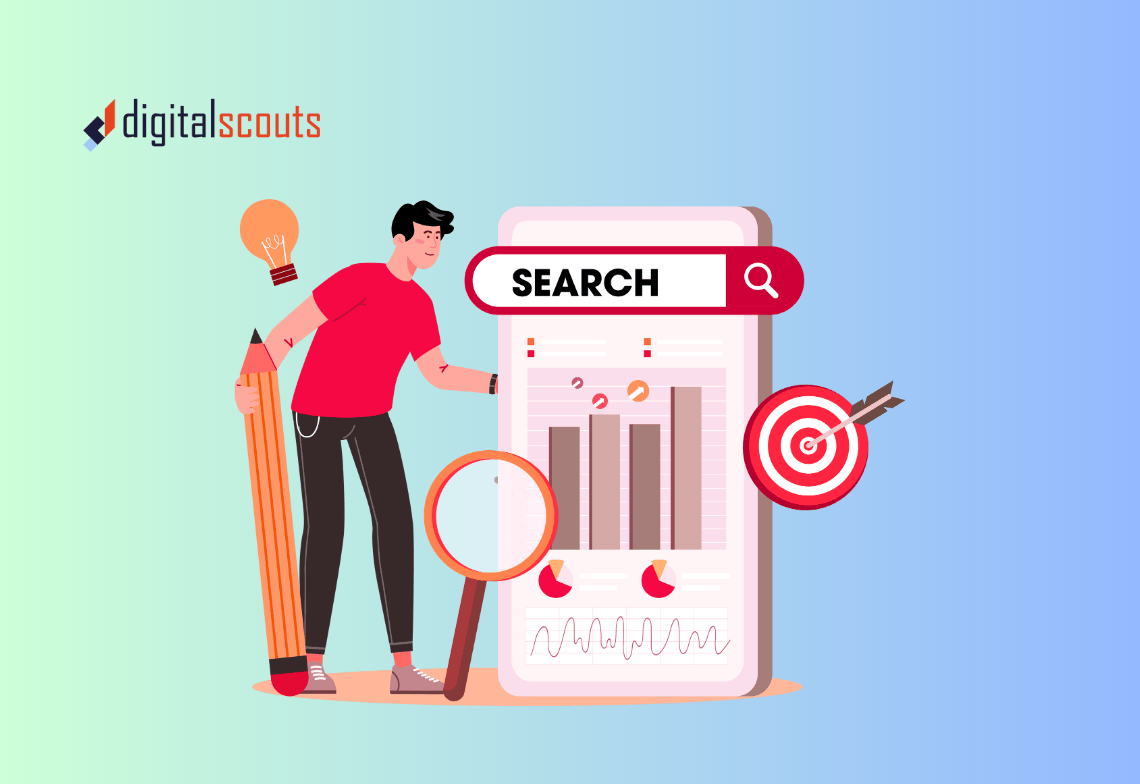The search landscape continues to change faster than ever. In 2025, SEO is no longer only about keywords and backlinks — it is about aligning with user intent, AI-powered search behaviour, and a holistic digital experience.
With the rapid adoption of generative search engines such as Google AI Overviews, SearchGPT, and Perplexity, marketers must rethink how content is created, optimised, and discovered. These changes present both challenges and opportunities for B2B brands looking to maintain visibility and attract quality traffic.
This guide explores the five key SEO trends that will define 2025 and how to apply them strategically to build authority, improve rankings, and drive sustainable growth.
1. Adapting to AI-Powered Search Engines
AI-driven search engines are transforming how people find information. Instead of scanning a list of links, users now receive instant, conversational answers generated by large language models. For many queries, this means fewer clicks to individual websites and more emphasis on trusted, comprehensive content that AI systems can reference directly.
To stay visible within AI-powered results, marketers need to optimise content for intent and context, not just keywords.
Practical steps to adapt:
-
Structure content around complete, question-based answers that align with how users phrase real queries.
-
Use conversational, natural language that mirrors search behaviour.
-
Build authority by creating detailed, evidence-backed explanations rather than keyword-stuffed articles.
-
Focus on long-tail and intent-based search phrases such as “best CRM for small B2B teams” instead of broad terms.
-
Provide clear, factual data that AI systems can cite confidently in summaries or overviews.
As AI search continues to expand, visibility will favour brands that publish expert content designed for understanding, not just indexing.
2. Staying Ahead of Algorithm Changes
Google’s algorithms evolve constantly, but the shift in 2024 and 2025 is clear: user experience and relevance outweigh technical manipulation. The inclusion of platforms like Reddit, Quora, and LinkedIn posts in search results reflects Google’s focus on authentic, community-driven insights.
Rather than reacting to every update, successful SEO strategies in 2025 will focus on long-term content value.
Key actions:
-
Write for people first, algorithms second. Prioritise depth, accuracy, and usefulness.
-
Keep visitors engaged with strong introductions, clear structure, and multimedia support such as videos and infographics.
-
Build traffic resilience by diversifying beyond Google — including social SEO, podcasts, newsletters, and branded search.
-
Monitor updates but avoid short-term ranking hacks. Sustainable performance comes from consistent quality.
At Digitalscouts, we recommend aligning your SEO content calendar with your RevOps goals, ensuring every piece supports lead generation and brand visibility simultaneously.
3. Strengthening E-E-A-T and Author Authority
Google’s focus on Experience, Expertise, Authoritativeness, and Trustworthiness (E-E-A-T) continues to shape rankings, particularly in competitive B2B industries. Establishing credibility through authentic authorship and transparent sourcing is no longer optional — it is a ranking requirement.
How to build credibility:
-
Feature recognised subject-matter experts and include detailed author bios that highlight credentials and real experience.
-
Cite reliable sources, statistics, and original research to strengthen authority.
-
Publish thought leadership content that shares lessons learned, not generic advice.
-
Include case studies, testimonials, and data from real campaigns to demonstrate experience.
-
Maintain consistency between on-site and off-site branding, ensuring authors are visible on LinkedIn and other professional networks.
A strong E-E-A-T profile sends clear signals to both search engines and audiences that your brand can be trusted to provide expert guidance.
4. Elevating Technical SEO
Behind every great SEO strategy is a technically sound website. As search engines rely on structured data and page experience signals to understand and rank content, technical SEO remains the foundation of performance.
Core technical priorities for 2025:
-
Structured data and schema markup: Use schema to help search engines understand entities, FAQs, and product or service information.
-
Website speed: Optimise Core Web Vitals to improve page load times and user satisfaction.
-
Mobile-first experience: Ensure responsive design, fast image rendering, and easy navigation.
-
Clean site architecture: Fix broken links, resolve duplicate content, and strengthen internal linking for better crawl paths.
-
AI and JavaScript indexing: Make sure dynamic content is visible to search engines by testing how JavaScript is rendered.
Investing in a solid technical foundation ensures that your content is discoverable, indexable, and ready for future innovations like voice and multimodal search.
5. Balancing AI and Human-Created Content
AI has transformed how content is produced, but the best performing pages in 2025 will still combine AI efficiency with human insight. Search engines are getting better at detecting originality, and readers can instantly tell when content lacks personality or expertise.
AI tools can help research, draft, and optimise content, but the final product must include the unique experience that only humans bring.
Best practices for human-AI collaboration:
-
Use AI to generate outlines, ideas, or competitor analysis, then refine manually with real examples and insights.
-
Avoid publishing raw AI output; always edit for accuracy, tone, and nuance.
-
Add original thought, brand perspective, and data to elevate content beyond automation.
-
Develop an internal style guide that defines tone, attribution, and brand voice so AI content remains consistent.
-
If possible, use business-specific data or customer insights to train AI prompts that reflect your niche more accurately.
In short, let AI handle speed and scale while your team provides authenticity and depth. That balance is what drives engagement and long-term search performance.
6. Integrating SEO with RevOps and Analytics
SEO does not exist in isolation. In 2025, performance measurement will shift from vanity metrics like impressions and keyword rankings to revenue-aligned indicators such as lead quality, pipeline contribution, and customer lifetime value.
Integrating SEO data with CRM and RevOps tools such as HubSpot allows marketers to see exactly how organic traffic contributes to business growth.
To connect SEO and RevOps effectively:
-
Track conversions from organic leads all the way to closed deals in your CRM.
-
Use HubSpot dashboards to align marketing KPIs with sales outcomes.
-
Analyse content performance by lifecycle stage — awareness, consideration, or decision.
-
Build attribution models that credit SEO for its role in influencing pipeline velocity.
By linking SEO efforts to measurable business outcomes, marketing teams can justify investment and continuously optimise for growth rather than rankings alone.
7. Future Proofing Your SEO Strategy
The future of SEO is adaptive. AI will continue to change how people search, but the core principles remain: create valuable content, ensure technical excellence, and deliver an exceptional user experience.
To stay future ready:
-
Update old content regularly to keep it accurate and competitive.
-
Invest in video and multimedia search optimisation.
-
Build topic clusters that demonstrate authority within your niche.
-
Encourage first-party data collection through newsletters and gated resources.
-
Stay informed about emerging technologies such as voice, visual, and contextual search.
SEO in 2025 is no longer a tactical checkbox — it is an integrated discipline that connects marketing, sales, and customer experience.
Final Thoughts
The evolution of SEO in 2025 represents both a challenge and an opportunity. AI is rewriting the rules, but it also rewards those who prioritise transparency, expertise, and real value.
Brands that combine strong technical foundations with authentic human storytelling will stand out across both traditional search and AI-powered discovery platforms.
At Digitalscouts, we help B2B companies implement modern SEO strategies that align with RevOps and automation. From technical audits to content systems and AI-assisted optimisation, we ensure your organic strategy drives measurable business growth.
If you are ready to strengthen your SEO performance for 2025, contact Digitalscouts for a consultation.
Frequently Asked Questions
AI-driven search engines like Google AI Overviews and SearchGPT analyse meaning and context, not just keywords. They pull insights from trusted, structured content to generate summaries and answers. Brands that use conversational language, factual data, and expert-backed explanations are more likely to be cited and visible within AI-generated results.
About Author
Matthew Rowlands is an AI & Digital Strategist at DigitalScouts, where he helps B2B teams integrate AI tools like HubSpot Breeze Agents into their marketing and RevOps workflows. He writes about automation, SEO, and using generative AI to scale content and campaigns.

.png?width=960&height=640&name=SEO%20Strategies%20for%202025%20(1).png)

.png?width=94&height=94&name=B2B%20Marketing%20Framnework%20(1).png)
.png?width=94&height=94&name=Email%20Marketing%20Strategy%20(1).png)



